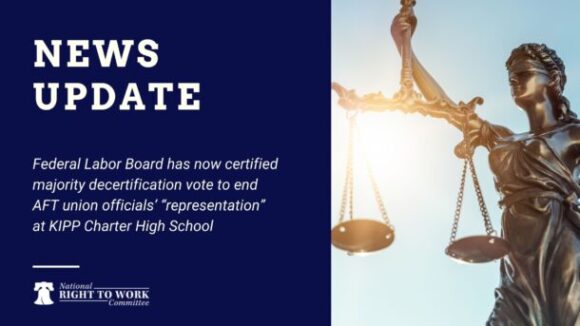Will Team Biden Weaponize Workers’ Pensions?
Big Labor abuse of worker pension and benefit funds as a means of advancing union bosses’ self-aggrandizing policy objectives is a familiar phenomenon.
It is an unfortunate fact that the labor-policy reporting supplied by mainstream media outlets such as the Associated Press frequently echoes Big Labor propaganda. Sometimes this results in “mere” gross distortions, and sometimes, like in an AP story filed yesterday afternoon (see the link below) from Jefferson City, Mo., it leads to flat-out inaccuracies.
On Wednesday, the Missouri House of Representatives voted to bar the firing of any state or local law-enforcement officer for refusal to pay dues or fees to an unwanted union. While the National Right to Work Committee believes all types of employees should be protected from compulsory unionism, this is a step in the right direction.
The AP, however, is quick to insinuate that safeguarding police officers’ freedom to refuse to bankroll a union they would never voluntarily join is somehow “unfair” to public-safety union bosses. The report goes on to assert:
Unions are required under federal law to represent all workers in a bargaining unit even if they are not members.
This assertion by a supposedly “objective” news reporter is wrong in multiple ways. We’ll mention just three today:
1) Federal labor law is totally irrelevant to the matter being discussed here. Missouri police unions have no privileges or duties of any kind under federal law. Federal law most certainly does not require police union bosses in Missouri or any other state “to represent all workers in a bargaining unit even if they are not members.”
2) While many states do have laws on the books empowering officials of a particular government union to force law-enforcement agencies to recognize them as the “exclusive” (monopoly) bargaining agent of all the police officers they employ, Missouri has no such law. The state Supreme Court ruled several years ago that, when a majority of employees favor unionization, government agencies can be forced to bargain with a union. However, the agency may recognize the union as the bargaining agent for its members only. No government agency in Missouri can be compelled under state law to recognize a union as the monopoly-bargaining agent of members and nonmembers alike. Government union agencies may decide, at Big Labor’s behest, to corral all employees under union control, but the law certainly does not require it.
3) The purpose of federal and state laws authorizing and promoting union monopoly bargaining is most assuredly not to “benefit” employees who don’t wish to join the union. As the U.S. Supreme Court bluntly explained in American Communications Association v. Dowds (1950), the National Labor Relations Act’s purpose in authorizing private-sector “exclusive” union bargaining is to foster “strong unions,” not to provide any benefit to employees who don’t wish to be unionized. In fact, under the NLRA “individual employees are required by law to sacrifice [bargaining] rights which, in some cases, are valuable to them.” What the High Court said with regard to private-sector employees in ACA v. Dowds applies equally well to public-sector employees covered by state labor laws analogous to the NLRA. To force union nonmembers to pay fees to a union they don’t want for the “privilege” of losing their personal bargaining rights is to add insult to injury.
Missouri House endorses ‘right-to-work’ for police

Big Labor abuse of worker pension and benefit funds as a means of advancing union bosses’ self-aggrandizing policy objectives is a familiar phenomenon.

What impact does handing a union monopoly power to deal with your employer on matters concerning your pay, benefits, and work rules have on your pay?

Federal Labor Board has now certified majority decertification vote to end AFT union officials’ “representation” at KIPP Charter High School